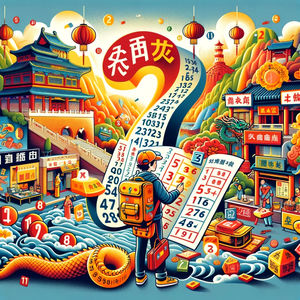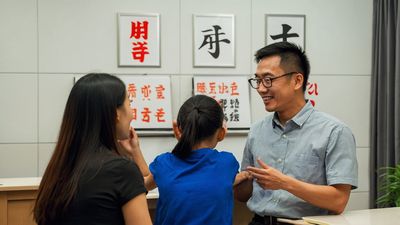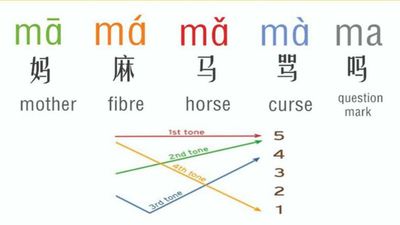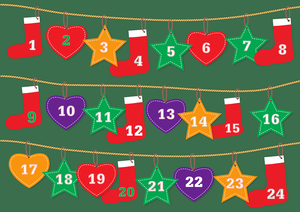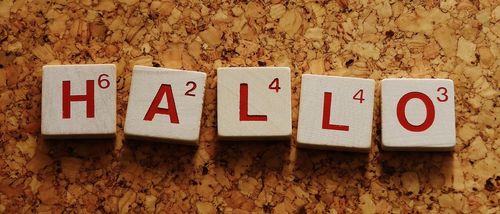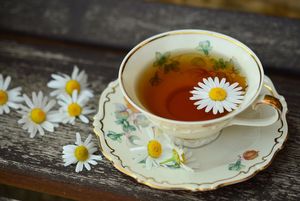Happy Birthday in Chinese: A Guide to Celebratory Phrases and Traditions
Discover how to say 'Happy Birthday' in Chinese and dive into the rich traditions of Chinese birthday celebrations. Learn phrases, customs, and etiquette for marking these special occasions
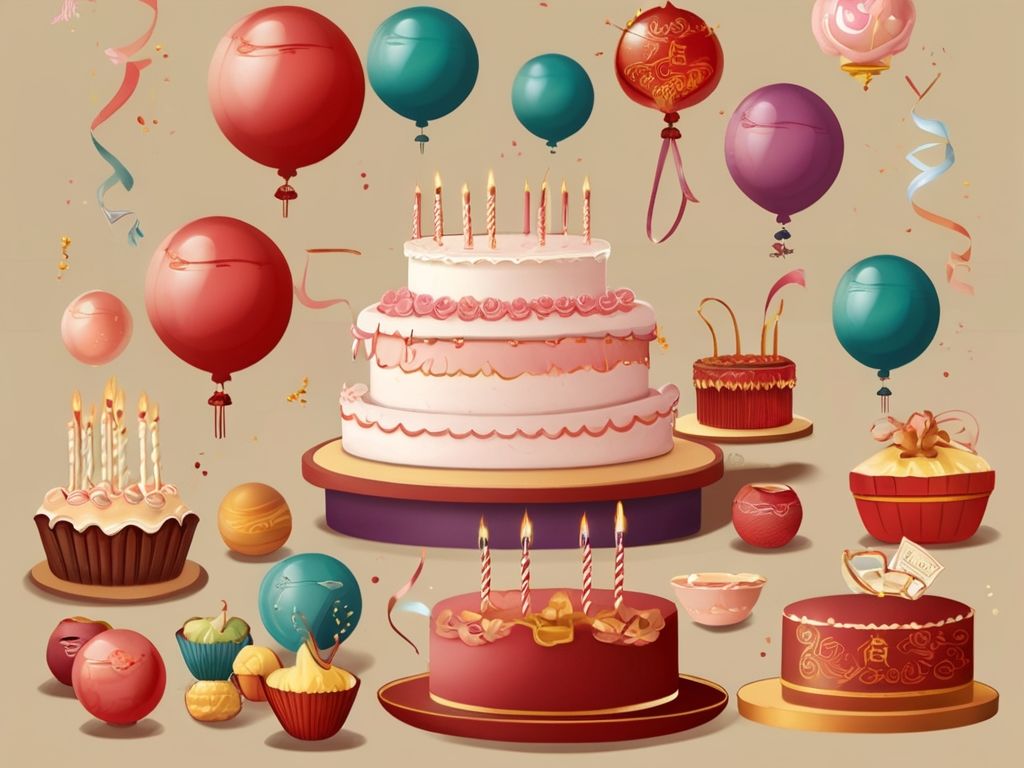
Happy Birthday in Chinese: A Guide to Celebratory Phrases and Traditions
I. Brief introduction to how "Happy Birthday" is expressed in Mandarin Chinese
The Cultural Tapestry of Birthdays
Historically, birthdays weren’t always celebrated annually in China, especially in rural areas where calendars were a luxury. The focus was often on celebrating the elderly, particularly the 60th birthday, signifying the completion of a full zodiac cycle and the start of a new one—a rebirth of sorts. Today, while these significant milestones still hold great importance, the influence of Western culture has woven new patterns into the fabric, introducing annual birthday celebrations to the mix. Yet, each celebration, whether modern or traditional, carries the weight of centuries-old values and the warmth of family and community ties.
Expressing "Happy Birthday" in Mandarin
When it comes to wishing someone a happy birthday in Mandarin, the phrase "生日快乐" (Shēngrì kuàilè) rings out, carrying with it more than just a simple greeting. "生日" (Shēngrì), meaning "birthday," and "快乐" (kuàilè), meaning "happy," come together in a melody of well-wishes that resonate with the communal spirit of Chinese celebrations. Pronounced shēng-rì kuài-lè, this phrase is your key to unlocking smiles and heartfelt thanks, whether you're writing it in a card, saying it in person, or singing it out loud in the birthday song that mirrors its Western counterpart in tune but dances with its own linguistic flair.
The Melody of Tradition and Modernity
As you extend these birthday wishes, you're doing more than just saying "Happy Birthday"; you're stepping into a circle of light that has illuminated Chinese lives for generations. You're embracing the joy of the individual and the collective, participating in a tradition that honors the past, celebrates the present, and looks forward to the future.
So, when you say "生日快乐," feel the weight of the words and the warmth they carry, bridging cultures and hearts. It's a simple phrase that opens doors to deeper understanding and connection, inviting you to partake in the rich tapestry of Chinese culture, where every birthday is a thread in the larger story of life.
II. Saying "Happy Birthday" in Chinese
Beyond the Basics: Variations and Formal Expressions
In the realm of birthdays, sometimes you want to add a sprinkle of extra sparkle to your wishes. Here are a few variations and more formal expressions to enrich your birthday lexicon:
• 祝你生日快乐 (Zhù nǐ shēngrì kuàilè): "Wishing you a happy birthday." Adding "祝你" (Zhù nǐ), meaning "wishing you," personalizes and adds warmth to the greeting.
• 生日快乐,祝你健康幸福 (Shēngrì kuàilè, zhù nǐ jiànkāng xìngfú): "Happy birthday, wishing you health and happiness." This extends the wish beyond the day, offering hopes for well-being and joy.
• 愿你生日快乐,岁岁平安 (Yuàn nǐ shēngrì kuàilè, suì suì píng'ān): "May your birthday be happy and every year peaceful." A deeper, more poetic wish that resonates with traditional values of peace and longevity.
Pronunciation Guide: Nailing the Nuance
Let’s break down the pronunciation to ensure your birthday wishes sound as sincere and joyful as they are meant to be:
• 生日快乐 (Shēngrì kuàilè): Try saying "shung-rì" (rhymes with "sung" as in "sung a song" but with a softer "g", and "rì" as in "ree") followed by "kwai-luh" (where "kwai" rhymes with "why" and "luh" is pronounced as in "lure" without the "r" sound).
• 祝你生日快乐 (Zhù nǐ shēngrì kuàilè): "Zhù" sounds like "joo" (rhyming with "zoo"), and "nǐ" like "knee". Combine them with "Shēngrì kuàilè" for a complete greeting.
III. Chinese Birthday Traditions and Customs
A Peek into History: The Roots of Chinese Birthday Celebrations
In ancient China, birthdays weren’t always the annual affair we know today. Emphasis was traditionally placed on celebrating the elderly, particularly their 60th birthday, which marked a full cycle of the Chinese zodiac and a significant life achievement. This day wasn't just about growing older but about honoring wisdom, longevity, and the blessings of life itself. For the young ones, the first birthday was notably important, symbolizing a hope-filled future in times when infant mortality was high. These celebrations were steeped in rituals, from calculating the precise astrological hour of birth to offering sacrifices to ancestors.
The Flavor of Longevity: Traditional Birthday Foods
Food plays a central role in Chinese birthday traditions, with certain dishes believed to bring luck, health, and longevity. Among these, longevity noodles, or "长寿面" (chángshòu miàn), hold a special place. These uncut, extra-long noodles symbolize a long and prosperous life. Slurping them up without breaking them is part of the fun and the challenge, each mouthful a wish for many more years to come. Other traditional foods include steamed buns shaped like peaches, known as "寿桃" (shòutáo), symbolizing immortality and good fortune.
The Tapestry of Today: Modern Birthday Celebrations
Fast forward to the present, and you’ll find that birthday celebrations in China have embraced many Western customs while still holding onto their rich heritage. Nowadays, it's common to celebrate every birthday, especially among the younger generations. Parties might feature cakes with candles to blow out, wishes made aloud, and gifts wrapped in red for luck. Yet, even as balloons and birthday cards find their place in the festivities, elements like longevity noodles continue to grace the table, linking the present with the past.
The Evolution of Celebration
This blend of the old and the new reflects a broader cultural evolution, where global influences mesh with deeply rooted traditions. In urban areas, especially, you might witness extravagant birthday parties complete with themes, DJs, and elaborate cakes. Yet, ask about the menu, and you'll likely find those same, cherished dishes that have symbolized hope and health for centuries.
IV. Birthday Songs in Chinese
Singing the "Happy Birthday" song in Mandarin Chinese offers a heartwarming way to celebrate and share joy on someone's special day. The melody remains the same as the English version, creating a familiar tune that's easy for everyone to follow, but the lyrics carry the distinctive charm and simplicity of the Mandarin language.
The Lyrics
Here's how the "Happy Birthday" song goes in Mandarin:
祝你生日快乐,Zhù nǐ shēngrì kuàilè
祝你生日快乐,Zhù nǐ shēngrì kuàilè
祝你生日快乐,Zhù nǐ shēngrì kuàilè
祝你生日快乐。Zhù nǐ shēngrì kuàilè
Pronunciation Guide:
• 祝你生日快乐 (Zhù nǐ shēngrì kuàilè): Zhu-nee shung-ree kwai-le
Translation
The direct translation of the lyrics into English is:
Happy birthday to you,
Happy birthday to you,
Happy birthday to you,
Happy birthday to you.
V. Special Birthday Celebrations
In Chinese culture, birthdays are not only personal milestones but also deeply ingrained traditions that celebrate life, wisdom, and the passage of time. While every birthday is special, certain years are marked with extra significance and grandeur. These special birthday celebrations are steeped in tradition, each with its own customs and meanings, reflecting the rich tapestry of Chinese cultural values.
The First Birthday (周岁, Zhōu Suì)
The first birthday is a significant event in a child's life, marking a crucial milestone for both the child and their parents. Traditionally, this celebration includes a ritual known as "抓周" (zhuā zhōu), where various objects like pens, books, coins, and other items are placed in front of the child. The object the child grabs is said to symbolize their future interests, career, or personality traits. It's a joyful occasion, full of hope and predictions for the child's future.
The 60th Birthday (花甲, Huā Jiǎ)
The 60th birthday is perhaps one of the most important milestones in Chinese culture, symbolizing the completion of a full cycle of the Chinese zodiac and the beginning of a new cycle. It's a celebration of longevity, wisdom, and the accumulation of life experiences. Traditionally, the family hosts a large banquet in honor of the celebrant, inviting extended family members, friends, and neighbors to share in the joy. The color red, symbolizing happiness and good fortune, features prominently in decorations and attire.
The 100th Birthday (百岁, Bǎi Suì)
Reaching 100 years old is an extraordinary milestone, celebrated with immense respect and admiration for the celebrant's longevity. This celebration is not just a family affair but often a community event, with descendants and neighbors coming together to honor the centenarian's long life. Gifts, usually symbolic of health and longevity, are given, and traditional foods are served to wish the celebrant continued strength and happiness.
Modern Celebrations
Today, the way these special birthdays are celebrated can vary significantly, blending traditional customs with modern practices. For example, elaborate birthday cakes, Western-style parties, and personalized gifts have become part of many celebrations, alongside traditional rituals and meals. Social media and technology also play a role in modern celebrations, allowing families spread across the globe to share in the joy and offer their wishes.
VI. Gift-Giving Etiquette
Navigating the nuances of gift-giving etiquette for birthdays in China can be akin to learning a delicate dance. Each step and gesture carries meaning, and understanding these cultural subtleties can help ensure your gift strengthens bonds and conveys the right message. Here's a guide to help you gracefully move through the process of selecting, presenting, and receiving birthday gifts in China.
Selecting the Right Gift
1. Consider the Relationship: The closer your relationship with the recipient, the more thought and significance should go into the gift. For close friends and family, personalized gifts that reflect the recipient's interests or needs are highly valued.
2. Avoid Cultural Taboos: Certain items carry negative connotations and should be avoided as gifts. For example, clocks (钟, zhōng) symbolize the passing of time in a way that suggests death and are thus considered bad luck. Similarly, sharp objects like knives or scissors can imply a desire to sever the relationship.
3. Opt for Auspicious Symbols: Gifts that symbolize longevity, prosperity, and health are always welcome. Items like tea, fruits (especially oranges and pomegranates for abundance and fertility), and items featuring the color red (for good luck) or gold (for wealth) are considered auspicious.
4. Practicality Matters: Practical gifts that the recipient can use in their daily life are often appreciated. However, ensure they are of good quality to show respect and consideration.
Presenting the Gift
1. Give With Both Hands: Presenting the gift with both hands is a sign of respect and emphasizes the sincerity of your gesture.
2. Timing and Discretion: While giving the gift in front of others during a birthday celebration can be appropriate, be mindful of the setting. If the gift is personal or if giving it publicly might cause embarrassment or discomfort, choose a more private moment.
3. Wrap It Right: Pay attention to the presentation. Use bright, cheerful colors for wrapping, such as red for luck. Avoid white, black, or blue wrapping paper, as these colors are traditionally associated with mourning.
Receiving Gifts
1. Show Restraint: If you're on the receiving end, it's customary to show modesty and initially refuse the gift lightly to demonstrate that you don't take the giver's generosity for granted. However, don't refuse too vehemently as to offend the giver.
2. Express Gratitude: Always thank the giver sincerely, though opening the gift in front of them isn't always necessary or expected. You can choose to do so later and then express your appreciation again.
3. Reciprocate Thoughtfully: While not immediately required, remember that gift-giving in China often implies a cycle of exchange. Offering a gift in return on another occasion is a way to maintain and strengthen relationships.
Understanding and adhering to these gift-giving etiquettes can help ensure that your birthday present is received in the spirit of friendship and respect it's intended. It’s a beautiful way to show care and respect for the cultural nuances that enrich the tapestry of Chinese social life, making every gift an opportunity to deepen connections and build lasting memories.
